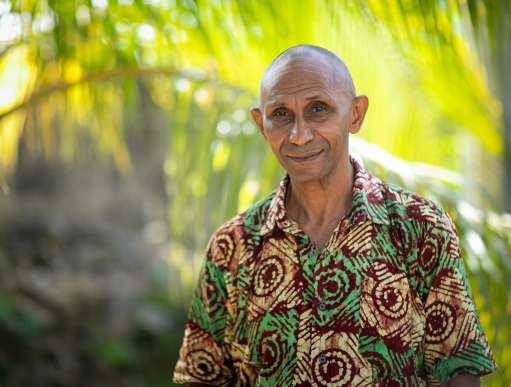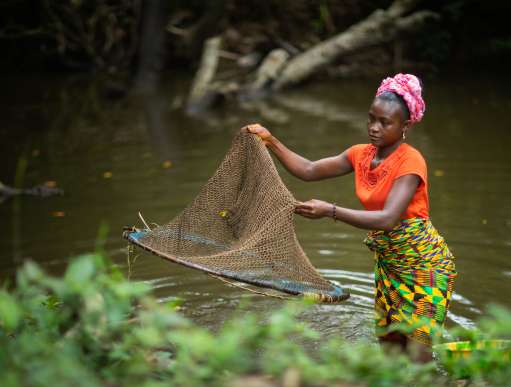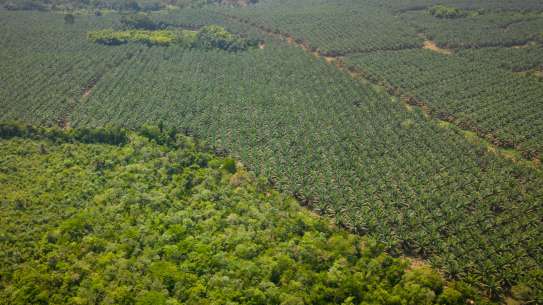In 2011, the Luxembourg-based palm oil producer Socfin won the right from the Sierra Leone government to lease for 50 years thousands of hectares of land in the Malen Chiefdom of Pujehun district in the South of the country.
Palm oil is a valuable commodity, traded across the world, and finds itself in thousands of products from food to cosmetics and biodiesel.
At first, there was hope that local people would benefit from jobs and be properly compensated for the leasing of their farmland. However, it didn’t take long for the villagers of Malen to feel aggrieved by the presence of the palm oil plantation.
Many in Malen denounced the agreement as illegitimate, citing a lack of prior consultation. Some denied that they had consented to the leasing of their land, while others claimed that they had been pressured and even intimidated into leasing. Most agreed that people were not being paid a fair price for their land.
Local resistance began as soon as the company first started operations. The communities organised themselves in to the Malen Land Owners Associated (MALOA) and issued a letter in 2011 setting out their grievances.
Alarmingly, peaceful protests faced violence from both the police and the army willing to use teargas or even live bullets to break up demonstrations. An early protest led to the arrest of 40 protestors, and the jailing of 15 for ‘riotous conduct’. Confrontations continued throughout the decade and in January 2019 two villagers were killed during a demonstration.
Socfin now controls over 18,000 hectares, more than two thirds of all the land in Malen chiefdom. Over 12,000 hectares have been planted with oil palm, making it the largest palm oil plantation in the country.
According to a report by global human rights organisation FIAN International, the plantation created less than 1,200 permanent jobs. Another 2,500 casual labourers are employed under precarious and exploitative conditions, earning on average below half the Sierra Leone minimum wage. There have been several worker strikes and instances of child labour have been reported , with children assist parents with their work.
In total, more than 30,000 people in over 50 villages have been impacted by the plantation, which has resulted in pollution and destruction of farmland.
Image credits and information

“Malen is now just a sea of palm trees,” said Joseph Rahall, executive director of local campaigning organisation Green Scenery, which has worked closely to support locals since the arrival of the palm oil plantation.
Since leasing their land many families have been unable to feed themselves and many had no choice but to leave the area in order to survive.
A loss of farmland to harvest has meant a loss of income, and as a consequence a number of children have also been forced to drop out of school because families are no longer able to afford school costs. In such cases it is more common for girls to be withdrawn from education first.
Jospeh explained why so many people were unable to get a fair deal for their land. Individual families have owned their own land since British colonial times but local customary laws gives ‘Paramount’ chiefs and chiefdom councils the authority to negotiate on behalf of the community,” he said.
He also outlined why so few benefitted financially from the leases with the plantation. “People are meant to receive $12.5 per hectare per year for every hectare of land leased to the plantation, however nobody knows exactly the size of land they have, so they don’t receive what they are supposed to get.
“What is worse is that the farmers then have to give over 50% of this amount in tax. 20% goes to the local chief, 20% to the district council and another 10% to the Sierra Leone government.”
The financial settlement has been particularly tough on women, as the land is not in their name. “The money never makes it to women, who are the first to suffer,” Joseph explained.
It is estimated that up to 400 people have abandoned Malen since the arrival of the plantation because they were no longer able to financially support themselves.
One of those who left the chiefdom is Hawa Sannoh. Hawa moved with her family to another village in Pujehun following the death of her father.
Image credits and information

I left Malen because the chief took my father’s farmland. His land was sold without his consent. He used to have lots of land which he would grow palm oil, fruit and vegetables. He was left with nothing.
Hawa said the loss of the land was a devastating blow to her father. “He ended up getting sick from high blood pressure and had a heart attack. He lost his life due to the stress. After that my mother decided to go back to her family’s village.”
Hawa is one the 300 women impacted by the arrival of the palm plantation who have joined a savings and loans scheme that allows local women access to cash they need to set up businesses but also to pay for essential costs during emergencies.
The savings and loans scheme will be funded by donations raised by the Presbyterian Church in Ireland’s annual World Development Appeal and run by Christian Aid’s local partner the Council of Churches in Sierra Leone.
Despite the hardships faced by the villages of Malen since the arrival of the plantation, recent campaign successes have led to increased hopes for the future.
Christian Aid supports Green Scenery with Irish Aid funding in their efforts to help people in Malen gain greater control over their land leases.
Green Scenery led the successful ‘My land, my vote’ campaign, which campaigned for political parties in Sierra Leone to make a manifesto commitment to land rights.
In September 2022, this led to the creation of two new land laws, designed to help empower local farmers to negotiate the value of their land. The new land laws also guarantee that women and men can jointly register ownership of their land. However, Jospeh remains sceptical that the law will bring immediate improvements to people in Malen until the company agree to renegotiate previous deals so that leaseholders are paid a fair price.
Regardless of ongoing challenges, Green Scenery continues to raise awareness of the new land laws with the local community as well as working closely with chiefs to make sure the new laws are obeyed.
